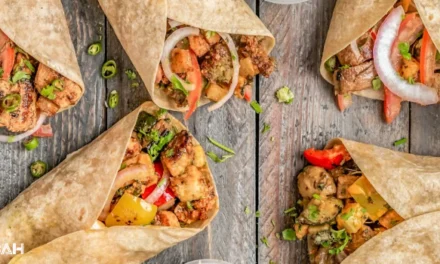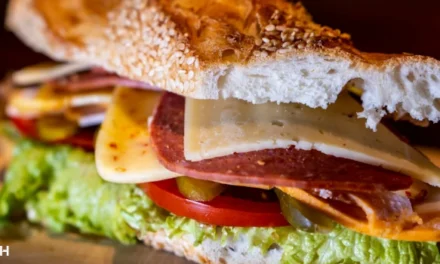Burger King is one of the most iconic fast food chains in the world. With over 18,000 locations across more than 100 countries, it is the second largest burger chain after McDonald’s. Many Muslim consumers wonder if Burger King serves halal food options that comply with Islamic dietary laws. This comprehensive article provides an in-depth examination of Burger King’s halal certification policies, menu offerings, and preparation procedures to help Muslims determine if they can eat halal at Burger King.
Understanding Halal Food Standards
Before looking specifically at Burger King, it is helpful to understand what constitutes halal food for Muslims. Halal is an Arabic term meaning “permissible” or “lawful” under Islamic dietary guidelines. The opposite of halal is haram, meaning “prohibited”.
Muslims’ diets are shaped by Quranic verses and hadiths that outline foods and methods of preparation that are halal and foods that are clearly haram, or forbidden. Among the major prohibitions are eating pork or pork by-products, alcohol or other intoxicants, beasts of prey and carnivorous animals, and any food contaminated with or prepared alongside haram products.
For meat to be considered halal, the animal must be slaughtered by a Muslim who invokes Allah’s name and slices the throat to allow blood to fully drain from the body. This method of ritual slaughter is called zabiha and is believed to minimize an animal’s suffering. Beef, lamb, goat, fish and poultry slaughtered via zabiha are halal, but meat from animals that die of natural causes or ritual slaughter by non-Muslims does not qualify. Even zabiha meats can be rendered haram if they come into contact with foods Islam prohibits, such as pork or alcohol.
Restaurants can have their menus and preparation procedures audited and certified as compliant with halal standards by reputable certification bodies like the Islamic Food and Nutrition Council of America or the Halal Monitoring Committee. Full halal certification provides assurance to observant Muslims that all menu items meet religious dietary guidelines. However, lack of certification does not automatically mean a restaurant’s food is haram either. Individual menu items may still be halal compliant depending on their ingredients and handling.
For devout Muslims who closely follow Quranic food prohibitions, verifying that meals outside the home are completely halal is an important part of adhering to their faith. That is why questions around whether major restaurant chains like Burger King serve halal options generates so much interest in Muslim communities.
Limited Halal Certification in the United States
Burger King’s halal certification policies vary significantly by region. In the United States, Burger King has no chainwide halal designation. Only a small fraction of locations have pursued third-party halal certification on their own. Approximately 100 out of over 7,000 Burger King restaurants in America have been certified, most of which are concentrated in Metro Detroit, New Jersey and Texas with sizable Muslim populations.
For example, an outlet in Dearborn, Michigan displays an Islamic Food and Nutrition Council of America (IFANCA) certificate verifying its halal compliance. IFANCA is a respected non-profit that monitors adherence to halal standards across the supply chain, from vendors to distributors to restaurants. Individual Burger King franchise owners in areas with strong Muslim demand have found it beneficial to undergo voluntary halal audits by organizations like IFANCA to attract observant Muslim diners seekinghalal fast food options.
However, there is no mandate from Burger King corporate requiring franchisees to have halal certification. Obtaining halal compliance documentation is left to the discretion of local owners. Since pursuing third party audits involves additional costs, only a handful of Burger King locations in America have opted to become officially certified halal.
Widespread Halal Certification Globally
In contrast to the United States, Burger King restaurants in many other countries with large Muslim populations have attained comprehensive halal certification. According to Burger King, “nearly all locations across the Middle East and Southeast Asia” are certified halal.
For instance, Burger King UAE proudly declares on its website and menus that all its ingredients and procedures are officially certified by government bodies to meet Islamic Society of North America Halal standards. Burger King Saudi Arabia obtained approval from the Saudi Food & Drug Authority confirming its adherence to halal regulations in areas like segregated storage, preparation and serving of menu items.
In Malaysia where over 60% of citizens are Muslim, Burger King partnered with the Islamic Development Department of Malaysia (JAKIM) to have its supply chain, quality control and training procedures audited and endorsed. Burger King Indonesia also has full halal assurance certification from the Ulema Council of Indonesia.
One of Burger King’s largest international markets is India, home to around 200 million Muslim residents. In 2005, Burger King was among the first major American fast food chains to receive halal certification in India. Today, its franchise partner Burger King India Pvt. Ltd. maintains halal compliance through regular audits by the Halal India Pvt. Ltd. certifying body. Burger King’s commitment to serving the dietary needs of its Muslim consumer base has supported its rapid expansion across the country.
Clearly, in nations where Islam is practiced by a majority of the population, Burger King makes far more halal menu options available and pursues official certification to drive business. The situation is quite different in the United States where less than 1% identify as Muslim and far fewer restaurants are under pressure to accommodate halal consumers.
Which Burger King Menu Items Are Typically Halal?
Given Burger King’s limited halal certification in America, which menu offerings can Muslims feel comfortable consuming? According to Burger King’s customer service department:
“Most menu items, including beef burgers, french fries, and desserts, are halal because they are prepared according to Islamic law and free of any alcohol or pork products.”
Specifically, the following Burger King menu categories are normally compliant with halal diet restrictions even without special certification:
Beef Hamburgers and Sandwiches
Burger King states its hamburger and cheeseburger patties contain 100% beef and are not mixed with pork or other meat sources during processing. As long as the beef is from cattle slaughtered via zabiha techniques, the plain hamburgers and sandwiches should qualify as halal. However, some Muslims dispute whether flash freezing methods used to preserve fast food beef burgers affect their halal status.
French Fries
Burger King fries are fried in dedicated vegetable oil cookers separate from equipment used for meat items. There is little risk of cross-contamination from pork or alcohol introduced during preparation. Burger King’s website confirms no beef flavors or extracts are added to the fry oil.
Salads
Fresh salads including garden salads, apple cranberry salads and Southwest salads only contain vegetable ingredients that are intrinsically halal. Without croutons or dressings containing pork-derived gelatin, these salad options should meet halal guidelines.
Wraps
Wraps are off limits for Muslims if they include pork products like bacon or ham. However, grilled chicken wraps or veggie wraps are fine, provided the chicken meets zabiha standards. The tortillas, veggies, cheeses and condiments contain no haram substances.
Breakfast Items
Breakfast sandwiches made with sausage or bacon are clearly not halal due to the pork content. But sandwiches made with eggs, cheese and beef sausage should be acceptable if the meat is halal certified. Side dishes like hash browns and oatmeal contain no forbidden ingredients as well.
Desserts
Burger King offers standard American desserts like soft-serve ice cream, apple pie and cookies with no alcohol or pork-derived ingredients. As long as separate serving utensils are used, the desserts align with halal principles. The same holds for milkshakes made with ice cream.
Beverages
Fountain drinks like Coke, Sprite and iced tea are perfectly fine, as are bottled waters and juices. The beers Burger King sells at some locations would not be deemed halal.
By sticking to basic hamburgers and cheeseburgers, fries, salads, wraps without pork and desserts, observant Muslims can reasonably eat halal at Burger King in America.
Which Burger King Menu Items Are Not Halal?
Certain menu items definitely do not qualify as halal due to containing or coming into contact with prohibited substances, mainly pork:
Bacon
Any burger or sandwich topped with bacon or bacon strips contains pork, which Muslims regard as haram. Bacon is one of the most clearly forbidden foods in Islam.
Ham
Like bacon, ham is cut from a pig and not consumable for Muslims. Sandwiches or croissants with ham or pork are off-limits.
Sausage
The Burger King breakfast menu includes several varieties of pork sausage, either as a patty or part of sausage gravy. These contain pork and are not halal. Beef sausages could be halal but require verifying.
Ribs
Burger King has offered pork ribs as a seasonal menu item which are obviously not halal. Beef ribs would be acceptable if the slaughter was halal.
Chicken
While chicken is generally halal, Burger King’s customer service has clarified their chicken is not slaughtered in a halal compliant manner. So all chicken sandwiches and nuggets should be avoided.
Fish Sandwiches
The fish fillets used in sandwiches are not confirmed to come from halal vendors, so observant Muslims should steer clear.
Cooking Oils
If the same fryers or other equipment is used to prepare both halal and non-halal menu items, cooking oils can become cross-contaminated. Pork residue on utensils or in oil vats could render even beef patties or fries haram by mixing meat sources.
When ordering at Burger King, Muslims should be cautious choosing sandwiches with bacon, ham or pork sausage as well as ribs, chicken or fish unless they can verify the halal status of those menu components. Cross-contamination of cooking oils is also a concern at restaurants lacking rigorous protocols.
Tips for Ordering Halal at Burger King
Given the ambiguities around Burger King’s halal compliance in America, what steps can observant Muslims take to best ensure their meal adheres to Islamic dietary laws when dining there? Here are some practical tips:
-
When possible, choose a location advertising halal certification on its premises or website. Although relatively rare in the U.S., some outlets prominently display halal logos and teachings.
-
Stick to basic hamburgers, cheeseburgers or Whoppers without bacon or ham toppings. Avoid pork and maximize chances of halal beef.
-
Order fries, salads and desserts over sandwiches with questionable ingredients like chicken, fish or sausage.
-
Request sandwiches be specially ordered and prepared to omit bacon if it normally comes included.
-
Ask front counter staff if beef patties, chicken, sausage or fish are halal certified. Their ingredients and supply chain may meet Islamic standards even if the restaurant itself is not certified.
-
Inquire about the possibility of cross-contamination of equipment and cooking oils between halal and non-halal food prep.
-
Kindly ask if employees have training in halal food handling and preparation.
-
Check with local Muslim groups as to the reputation of that particular Burger King location for accommodating halal requests.
-
Call ahead to ask questions rather than ordering in-person if that is more comfortable.
While imperfect, being informed and asking the right questions maximizes the chances of receiving halal compliant meals from Burger King in America.
Potential Issues Impacting Burger King’s Halal Status
There are a few outstanding issues that create uncertainty around some Burger King menu items truly meeting strict halal standards:
Beef Slaughtering Practices
As mentioned, there is debate among Muslim scholars if the large-scale mechanical slaughterhouses that supply Burger King’s beef comply with zabiha guidelines or if hand slaughter is required. The capacity of plant machinery to invoke Allah’s name on each animal is also questioned.
Beef Preservation
Islamic religious authorities disagree over whether the modern techniques like flash freezing that allow fast food chains to preserve beef burgers disrupt their halal integrity. Chemical changes from freezing and thawing processes are concerning to some.
Machine Slaughter of Chicken
Burger King’s admission that their chicken is not slaughtered in a halal compliant fashion means observant Muslims must avoid it. Some do permit machine slaughter if certain prayers are recited, but Burger King makes no such claim about its chicken sourcing.
Cross-Contamination
The potential for cross-contamination between halal beef and haram pork on shared grills and in fryer oil is a major consideration lacking stringent protocols. Many scholars require halal foods be prepared with utensils used exclusively for halal cooking.
Alcohol in Flavorings
Small amounts of alcohol are commonly used as solvents and preservatives in natural and artificial flavorings. Burger King does not address whether flavorings added to beef patties and buns contain these negligible traces of alcohol which some deem impermissible.
Employee Awareness
Burger King staff in America likely lack substantive training or certification in maintaining halal integrity throughout ordering, prep, cooking and serving. Human error or disregard for strict specifications can easily occur.
Conservative Muslims who only eat halal may want to avoid Burger King until these issues are satisfactorily addressed by corporate policies. Those taking a more flexible approach can eat selectively from the menu by following the guidance provided earlier.
Is Burger King Halal? The Verdict
In conclusion, while many core menu items are halal compliant if Burger King’s own descriptions are credible, full halal certification of their ingredient sourcing, cooking procedures and staff training practices is limited in America. Locations explicitly certified as halal are scarce, found mainly in metro areas with significant Muslim populations like Detroit where the demand exists.
Internationally, Burger King receives high marks for making halal food easily accessible across Asia and the Middle East in accordance with local customs. But in the U.S., they lag far behind competitors like McDonalds and Subway in officially offering halal alternatives.
Observant Muslims comfortable using their best judgement can eat halal at Burger King by avoiding pork products, asking questions and evaluating the training of local staff. Those seeking guaranteed adherence to Islamic dietary laws are better off patronizing a halal-only burger restaurant or fully certified eatery until Burger King improves transparency around their domestic halal policies.
The truth of whether Burger King is halal-compliant or not varies franchise by franchise. Blanket pronouncements are difficult in such a decentralized restaurant chain. Individual Muslims must weigh all the evidence available to make an informed decision aligned with their personal interpretation of halal principles whenever dining outside the home.
FAQ – Is Burger King Halal
Burger King is a fast-food chain that offers halal options in certain locations. However, the availability of halal may vary depending on each Burger King location and the local market demand. It is important to check with your local Burger King to determine if they serve halal food.
Does Burger King offer halal meat?
Yes, Burger King does offer halal meat in some of its locations. The decision to serve halal meat is made on a store-by-store basis, considering the local demand for halal food. If halal meat is important to you, please confirm with your local Burger King if they offer this option.
Is Burger King halal-certified?
Burger King as a whole is not halal-certified, but certain Burger King outlets may have obtained halal certification. It is important to verify with your local Burger King if they have the necessary certifications to serve halal food.
Are all menu items at Burger King considered halal?
No, not all menu items at Burger King are considered halal. While certain locations may offer halal options, it is crucial to check with your local Burger King to understand which specific menu items are halal and which are not.
How can I find Burger King’s halal status?
To determine Burger King’s halal status, you should directly contact your local Burger King and inquire about their commitment to serving halal food. They can provide you with the necessary information on the availability of halal options and their certification status.
Does Burger King franchise ensure halal conformity?
The decision to serve halal food at Burger King franchise locations is made independently by each franchisee and is not guaranteed across all locations. It is advised to reach out to your





